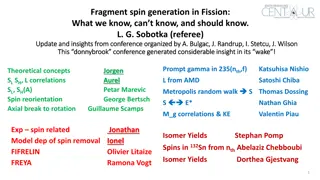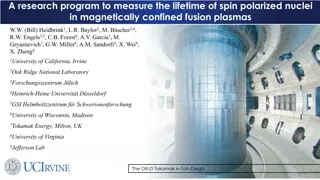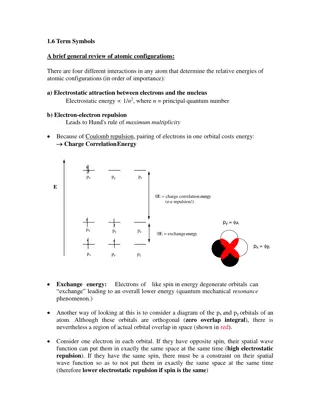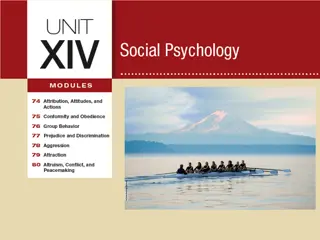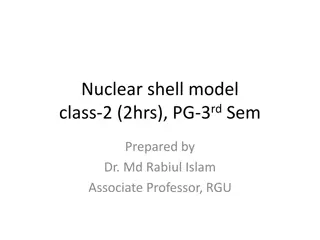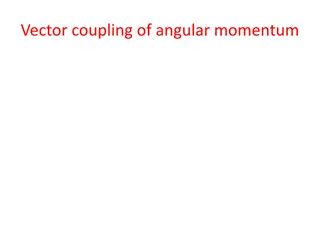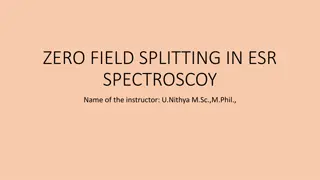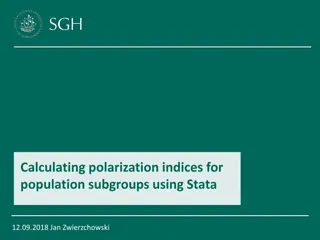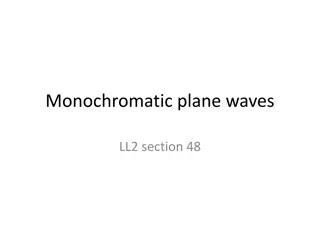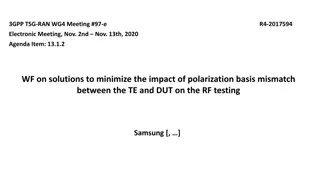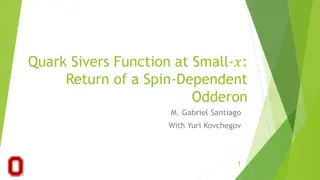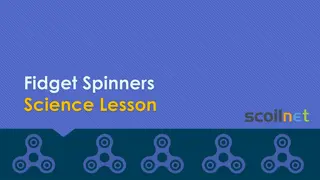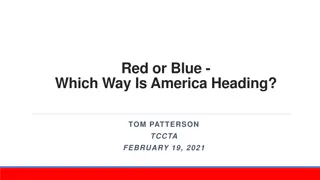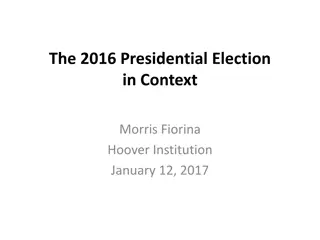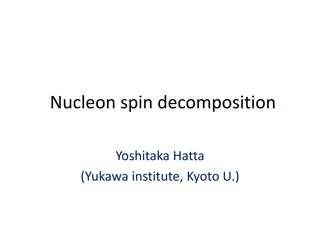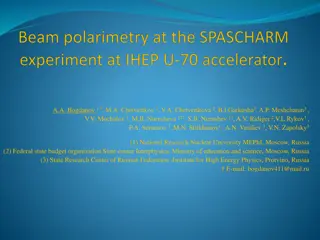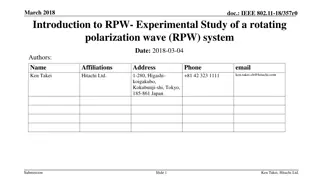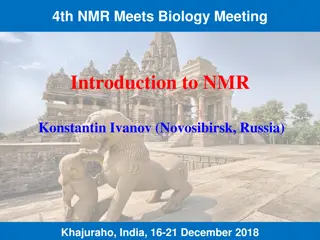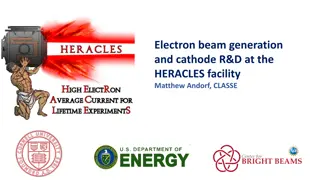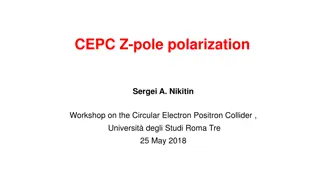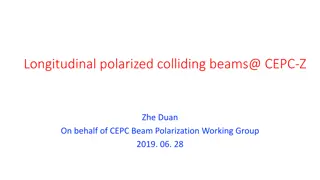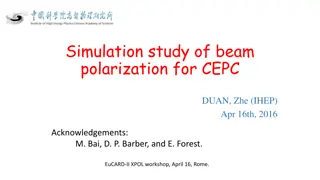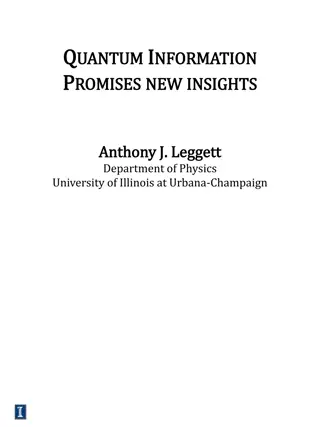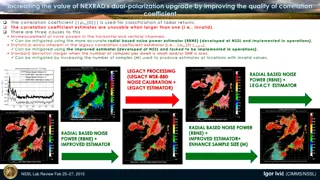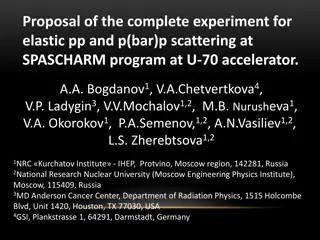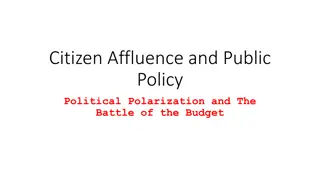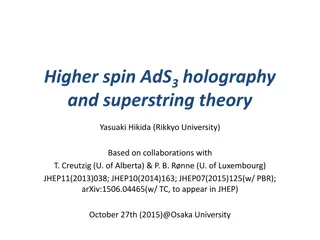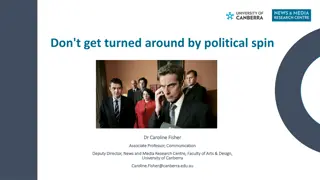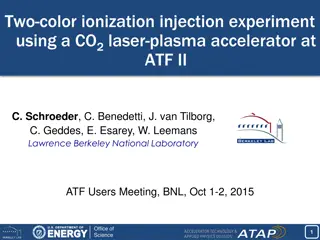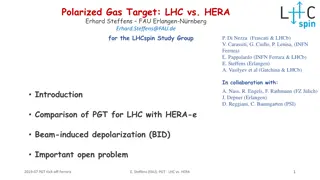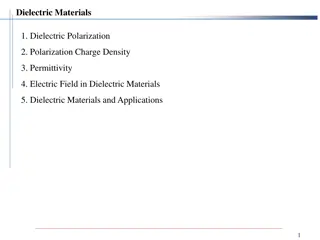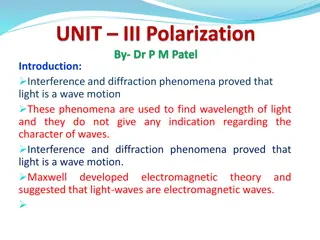Using the SPIN Funding Opportunities Database
Navigate the SPIN Funding Opportunities Database effectively with guidance from Karen Markin, Ph.D. Learn how to search by keywords, view results, and access program descriptions. Boost your grant-seeking success!
0 views • 15 slides
Insights on Fragment Spin Generation in Fission: What We Know
Considerable insight was generated from a recent conference on fission, shedding light on crucial theoretical and experimental aspects. Key topics include angular momentum, fission-fragment spin references, and the dynamics of nuclear fission. Theoretical advancements like the TDSLDA model and super
3 views • 41 slides
Research Program on Spin Polarized Nuclei in Fusion Plasmas
Examination of spin polarized fuel in fusion plasmas to enhance energy production efficiency. Planned experiments aim to measure the lifetime of polarized nuclei for optimized fusion reactions. Key aspects include depolarization mechanisms, neutral beam heating, and fueling techniques with pellets.
1 views • 36 slides
Understanding AGN Jet Production Efficiency: Insights from Spin and Magnetic Flux
A fundamental question in astrophysics is how efficiently active galactic nuclei (AGN) produce jets. Black hole spin and magnetic flux play crucial roles in determining the jet production efficiency. High-spin values and large magnetic flux threading are essential for generating high-efficiency jets
2 views • 22 slides
Crystal Field Theory in Transition Metal Complexes
Crystal Field Theory (CFT) explains the colors and magnetic properties of transition metal complexes. It focuses on the energy changes in d-orbitals of metal ions caused by surrounding ligands. This theory, developed in 1929, provides insights into the bonding interactions in complex compounds. The
10 views • 44 slides
Understanding Atomic Configurations and Term Symbols
The energy of atomic configurations is determined by electrostatic attraction between electrons and the nucleus, electron-electron repulsion, spin-orbit coupling, and spin-spin interactions. Term symbols in electronic spectroscopy specify atomic states using quantum numbers. Hund's rule and the Paul
8 views • 12 slides
Understanding Group Behavior: Influence and Dynamics
Explore the impact of social facilitation, social loafing, and deindividuation in shaping individual actions within groups. Understand how group interaction can lead to phenomena like group polarization and groupthink. Dive into the role of the Internet in exacerbating group polarization and how cul
3 views • 35 slides
Theoretical Derivation and Application of Nuclear Shell Model in Quantum Physics
The nuclear shell model, a fundamental concept in quantum physics, is explained in detail using Schrodinger wave equations and spherical coordinates. The model describes the behavior of nucleons in atomic nuclei based on energy values, quantum numbers, and shell closure principles. Spin-orbit intera
0 views • 14 slides
Understanding Angular Momentum in Quantum Mechanics
Exploring the concept of total angular momentum in quantum mechanics, which involves the quantization of orbital and spin angular momenta. The coupling of these vectors leads to the formation of total angular momentum, with implications for the behavior of single-electron systems like the hydrogen a
0 views • 16 slides
Understanding Zero Field Splitting in ESR Spectroscopy
Zero field splitting in ESR spectroscopy involves the relaxation times in ESR and how spin-lattice relaxation affects the spectral width. Discover how T1 value and spin lattice relaxation play a crucial role in observing sharp spectrum lines in EPR. Learn about line widths in ESR, spin dilution, and
0 views • 21 slides
Understanding Economic Polarization and Polarization Indices
Explanation of the concept of economic polarization and the calculation of polarization indices for population subgroups using Stata. Discusses the disappearance of the middle income class, misuse of the term economic polarization, and measures like the median relative polarization index (MRP) for a
2 views • 15 slides
Understanding Monochromatic Plane Waves in Electromagnetic Theory
Explore the characteristics and properties of monochromatic plane waves in electromagnetic theory, including their spatial distribution, propagation in the positive X direction, wavelength, linear and non-linear operations, polarization direction, elliptical and circular polarization, and the relati
0 views • 15 slides
30 minute spin workout
Stress management is essential for overall health. Regular physical activity, especially high-intensity workouts like spin classes, is known to reduce stress levels. A 30 Minute Spin Workout provides a concentrated burst of exercise that stimulates t
3 views • 6 slides
Solutions to Minimize Polarization Basis Mismatch Impact in RF Testing
The agenda item discusses proposals to reduce the impact of polarization basis mismatch between the test equipment and device under test during RF testing in the 3GPP TSG-RAN-WG4 meeting. Various methods, such as the TPMI side condition method and DL polarization scan method, are being considered to
0 views • 10 slides
Understanding Quark Sivers Function and Spin-Dependent Odderon
Quark Sivers function, a key aspect in quantum chromodynamics, plays a role in capturing orbital angular momentum and spin-orbit coupling. Spin-dependent Odderon, an elusive three-gluon exchange, contributes to cross sections in high-energy collisions. Small-$? TMDs from polarized Wilson lines provi
0 views • 17 slides
Understanding Biased Assimilation and Attitude Polarization in Social Disputes
People with strong opinions on complex social issues tend to interpret evidence in a biased manner, accepting confirming evidence readily while subjecting disconfirming evidence to critical evaluation. This can lead to increased polarization rather than narrowing of disagreement when exposed to the
0 views • 20 slides
Exploring Fidget Spinners: Science Lesson on Spin Time and Averages
Uncover the fascinating world of fidget spinners with a science lesson on spin time measurement techniques, calculating averages, and factors influencing spin time. Dive into hands-on activities, investigations, and discussions on materials used, bearing types, and spinner weights.
0 views • 28 slides
The Divided States of America: A Look at Party Polarization
The images depict the growing party polarization in American politics, showing the widening gap between Republicans and Democrats since the 1980s. The data visualizations illustrate how the ideological divide has evolved over the years, culminating in high levels of animosity and competition between
0 views • 48 slides
Trends in U.S. Political Landscape: Polarization and Party Dynamics
The analysis delves into the evolution of the U.S. political scene, highlighting shifts in party majorities, polarization among liberals and conservatives, maintenance of moderate factions, the significance of independents, and the dominance of centrist issues. It explores the challenges posed by th
0 views • 37 slides
Simulation and Reconstruction on BEPCII Polarization Measurement
Simulation and reconstruction process for BEPCII polarization measurement involve generating events, recording back-scattered photons in phase space, analyzing polarization on glass plates and Si sensors, and fitting results to optimize data accuracy.
0 views • 17 slides
Understanding Nucleon Spin Decomposition and Proton Spin Problem
Explore the complex realm of nucleon spin decomposition and the enigmatic proton spin problem, delving into concepts like orbital angular momentum, quarks and gluons' helicity, and longitudinal double spin asymmetry in polarized deep inelastic scattering. Learn about the spin crisis, gluon polarizat
0 views • 26 slides
Measuring Proton and Antiproton Polarization at U70 Accelerator
Absolute polarimeters are described for the beam channel at U70 Accelerator in Russia, focusing on transporting polarized proton and antiproton beams. Various polarimeters are discussed for measuring proton and antiproton polarization, including diffraction and interference-based techniques. The exp
0 views • 37 slides
Experimental Study of Rotating Polarization Wave (RPW) System in Wireless Communication
A wireless system controlling polarization for improved communication quality was tested successfully in various environments, enhancing quality especially in cluttered spaces without line-of-sight paths. By manipulating polarization, data transfer reliability and effectiveness were enhanced, overco
0 views • 14 slides
Understanding Spin Magnetism in NMR: An Introduction to Angular Momentum and Magnetic Moments
Delve into the world of spin magnetism in NMR as we explore the concepts of angular momentum, magnetic moments, Stern-Gerlach experiments, and the quantization of spin. Learn about spin projections, spin relaxation, and the relationship between spin particles and external magnetic fields.
0 views • 34 slides
Electron Beam Generation and Cathode Research at HERACLES Facility
Research at the HERACLES facility focuses on electron beam generation and cathode development for high-current applications. Photocathodes play a crucial role in providing low energy spread beams required for processes like FEL-lasing. GaAs emerges as a promising candidate for spin-polarized electro
0 views • 33 slides
Radiative Polarization Techniques in CEPC for Precision Measurements of Z-Pole Mass
Prof. Jie Gao led discussions on the CEPC polarization program, focusing on obtaining transverse and longitudinal polarizations. The use of special wigglers to enhance the polarizing effect of the magnetic field was highlighted, reducing the time needed for radiative self-polarization. Strategies to
0 views • 22 slides
Achieving High Average Beam Polarization in Particle Colliders
Detailed discussion on achieving high average beam polarization in particle colliders like CEPC, focusing on longitudinal polarized colliding beams, beam polarization requirements, basic formulas, and strategies for maintaining beam polarization during physics runs. Emphasis on scenarios involving s
0 views • 16 slides
Beam Polarization Simulation Study for CEPC
Simulation study on beam polarization for the Circular Electron Positron Collider (CEPC) using the PTC Poly- morphic Tracking Code. The study includes orbital and spin tracking, equilibrium polarization calculation, and Monte-Carlo simulation of depolarization rate. Comparison with other Monte-Carlo
0 views • 20 slides
Exploring Quantum Information through Polarization of Photons
Quantum information and photon polarization are explored in this detailed presentation featuring the ultimate quantum 2-state system. The content delves into the behavior of single photons at a quantum level, showcasing the intriguing properties and implications of quantum superposition in polarizat
1 views • 14 slides
Enhancing NEXRAD's Dual-Polarization Upgrade for Improved Correlation Coefficients
Enhance the value of NEXRAD's dual-polarization upgrade by improving the quality of correlation coefficients, particularly focusing on the usability and accuracy of | ρ hv (0)| for radar return classification. Addressing issues with correlation coefficient estimates exceeding one is crucial for val
0 views • 6 slides
Investigation of Spin Observables in Elastic pp and p(bar)p Scattering at SPASCHARM Program
Measurements of spin observables in elastic pp and p(bar)p scattering at 16 GeV will be conducted at the SPASCHARM program using a unique setup with polarized proton and antiproton beams. The experiment aims to extend the energy range for spin studies and compare elastic scattering in pp and p(bar)p
0 views • 24 slides
Political Polarization and Public Policy Recommendations
This content discusses the relation between citizen affluence, public policy, political polarization, and budget battles. It includes images related to these topics and proposes strategies such as re-regulating Wall Street, taxing the rich, implementing universal preschool, imposing price controls o
0 views • 9 slides
Solutions to Minimize Polarization Basis Mismatch Impact in RF Testing
In the 3GPP TSG-RAN-WG4 Meeting #97-e, discussions focused on minimizing the impact of polarization basis mismatch between the TE and DUT in RF testing for Samsung devices. Various proposals were presented relating to EIRP measurement and methods to enhance testing procedures. Key topics included TP
0 views • 10 slides
Exploring Higher Spin AdS3 Holography and Superstring Theory
Delve into the fascinating world of higher spin gauge theory, Vasiliev theory, and their applications in AdS/CFT correspondence. Discover the complexity and tractability of higher spin states in superstring theory, as well as the concrete relations between superstrings and higher spin fields in AdS
0 views • 27 slides
Overview of CAIN Particle Tracking Code for High-Energy Colliders
CAIN is a particle tracking code used for high-energy collider simulations since 1984. Initially named ABEL, it evolved to include beam-laser interactions for gamma-gamma colliders. The code, written in FORTRAN 90, handles beam-beam and external fields, with a structure where all particles are store
0 views • 17 slides
Understanding Political Spin and Propaganda in Media
Explore the tactics of political spin and propaganda as tools used to shape public perception and manipulate information. Learn about the techniques politicians employ to navigate media dynamics and the covert spin tactics employed in the realm of communication and journalism.
0 views • 10 slides
Two-Color Ionization Injection Experiment Using CO2 Laser-Plasma Accelerator
This experiment conducted at ATF II focused on generating beams with ultra-low transverse emittance utilizing two-color ionization injection with a CO2 laser-plasma accelerator. The technique involves using a pump laser pulse in circular polarization and an injection laser pulse in linear polarizati
0 views • 15 slides
Comparing Polarized Gas Targets at LHC and HERA for Spin Studies
The comparison between Polarized Gas Targets (PGT) at the Large Hadron Collider (LHC) and HERA for spin studies is discussed. Key considerations such as beam-induced depolarization, beam parameters, and design aspects are highlighted. The importance of using a polarized gas target similar to HERMES
0 views • 15 slides
Understanding Dielectric Materials: Polarization Mechanisms and Applications
Learn about dielectric polarization, charge density, permittivity, and the electric field in dielectric materials. Explore different types of polarization mechanisms such as electronic, molecular, and ionic polarization, as well as how polarization charge densities are modeled. Discover the signific
0 views • 27 slides
Understanding Light Wave Polarization and Brewster's Law
Interference and diffraction phenomena demonstrate light as wave motion, leading to insights on wave nature. Maxwell's electromagnetic theory supports light as transverse waves. Learn about polarization of light waves, production methods, and applications in industry. Explore the discovery of light
0 views • 89 slides

